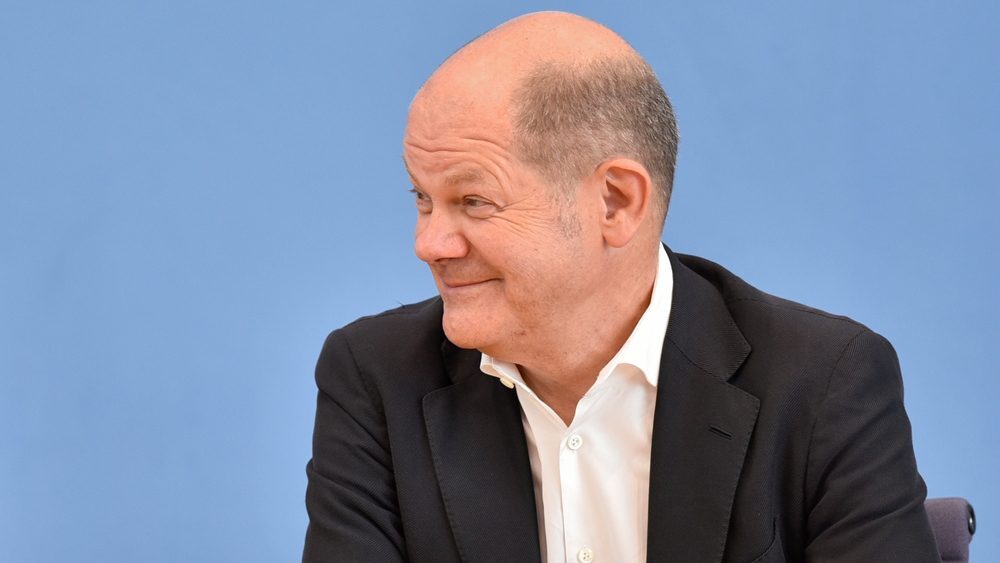
Olaf Scholz
Photo: photocosmos1 / Shutterstock.com
The managing director of the disinformation-peddling media outlet Correctiv met with German Chancellor Olaf Scholz days before the ‘secret’ Potsdam meeting, and the publication’s subsequent, grossly deceptive reporting on the gathering.
The outlet’s ‘investigative reporting’ from the meeting—in which it spread brazen lies about a non-existent Alternative für Deutschland (AfD) plan to deport millions of German citizens with migration backgrounds—propelled a wave of anti-AfD demonstrations across Germany and prompted calls for the traffic light coalition to ban the increasingly popular insurgent party.
News of Chancellor Scholz’s meeting with Correctiv’s managing director Jeanette Gusko, revealed by an inquiry from AfD MP Matthias Mossdorf, follows reports that divulged that the publication had met with officials from the federal government on numerous occasions, apparently to “exchange ideas” on what coverage is desirable.
In a response to the AfD MP’s official inquiry, the government confirmed that Correctiv’s managing director, Jeanette Gusko, met with representatives of the Federal Chancellery in Potsdam on two occasions in the weeks leading up to the conference.
Eight days before the conference in Lehnitzsee, Potsdam, Gusko personally met with Chancellor Olaf Scholz.
“A meeting between the Federal Chancellor and the managing director of Correctiv, Ms. Gusko,” took place “spontaneously on the sidelines of the East Germany 2030 Conference on November 17th, 2023,” the federal government’s response to Mossdorf’s inquiry into the matter reads.
Ten days earlier, a discussion group convened at the Federal Chancellery on November 7th, 2023, where Ms. Gusko took part and met the Federal Government’s Eastern Commissioner, Carsten Schneider (SPD), among others.
According to the German newsportal NiUS, over the past four years, Correctiv employees have had a total of 11 undisclosed meetings and discussions with government representatives. This, along with the fact that the media outlet receives much of its funding from the state, deeply calls into question just how ‘independent’ it is. The outlet received state funding to the tune of 2.5 million euros over the past decade.
The federal government, in its response to the AfD’s inquiry, opted to keep quiet about the nature of what was discussed during the meetings.
“Non-public or unpublished conversations that journalists have with representatives of authorities in the course of their editorial or research activities, which are protected by the freedom of the press” are covered by editorial or research secrecy, the German government said in its response.
The revelation of the meeting between Correctiv’s managing director and Chancellor Scholz days before the Potsdam Conference comes as seven of the gathering’s participants have announced their intention to submit affidavits in court refuting claims made in Correctiv’s reporting.
“Contrary to the Correctiv reporting, there was no mention of the expulsion of German citizens or expulsion based on racist criteria!” wrote Cologne press lawyer Carsten Brennecke Saturday, February 10th, in a post to the social media platform X.
Harter Gegenwind für Correctiv: Gleich 7 Teilnehmer des Potsdam – Treffens geben eidesstattliche Versicherungen ab: Entgegen der Correctiv – Berichterstattung sei dort nicht von der Ausweisung deutscher Staatsbürger oder einer Ausweisung nach rassistischen Kriterien gesprochen… https://t.co/b0zKrMMoZo
— Carsten Brennecke (@RABrennecke) February 10, 2024
Brennecke is acting as legal counsel for certain attendees of the conference, who are now seeking legal recourse against Correctiv to defend themselves against alleged violations of press law.
The media lawyer, in an interview with the newspaper Die Welt published over the weekend, noted that: “All participants in the meeting identified by name by Correctiv have been exposed to a gauntlet with serious consequences for their private and professional lives since the article was published.”
Correctiv, Brennecke argues, misrepresented the nature of the meeting in Potsdam and also distorted statements of its participants “in order to somehow maintain the narrative of the report.”
David Schraven, the founder of Correctiv, responded to the announcement that affidavits would be submitted in a threatening post on X. “I would be very careful if I were these people. We have no problem convicting seven people,” he wrote, highlighting that submitting false affidavits is legally “punishable.”
Gleich 7 Teilnehmer des Potsdam – Treffens versichern an Eides statt, dass die #Correctiv – Wertung, dort sei über die Ausweisung deutscher Staatsbürger oder eine Ausweisung nach rassistischen Kriterien gesprochen worden, falsch sei. Warum sollten diese Bestätigungen falsch sein,… https://t.co/EHy3n7FbLf
— Carsten Brennecke (@RABrennecke) February 11, 2024
Brennecke replied in turn, writing: “Why should these statements be false when even Correctiv, on closer inspection, has not yet claimed that these statements were made there—probably for good reason. I would be surprised if Mr. Schraven, now aware of the assurances, were the first in the house of Correctiv who firmly claims that this was really said at the ‘secret meeting.’”
As The European Conservative reported earlier this month after Correctiv came under fire for its false coverage of the Potsdam meeting:
Anette Dowideit, the deputy editor of Correctiv, said that the German press had “misinterpreted” major aspects of their reporting about the meeting that took place on November 25th in Potsdam, because her publication had in fact “not spoken of deportations or anything like that.” However, this is not true. The article explicitly states that the “shared goal” of the participants of the meeting “is the forced deportations of people from Germany based on a set of racist criteria, regardless of whether or not they have German citizenship.”
